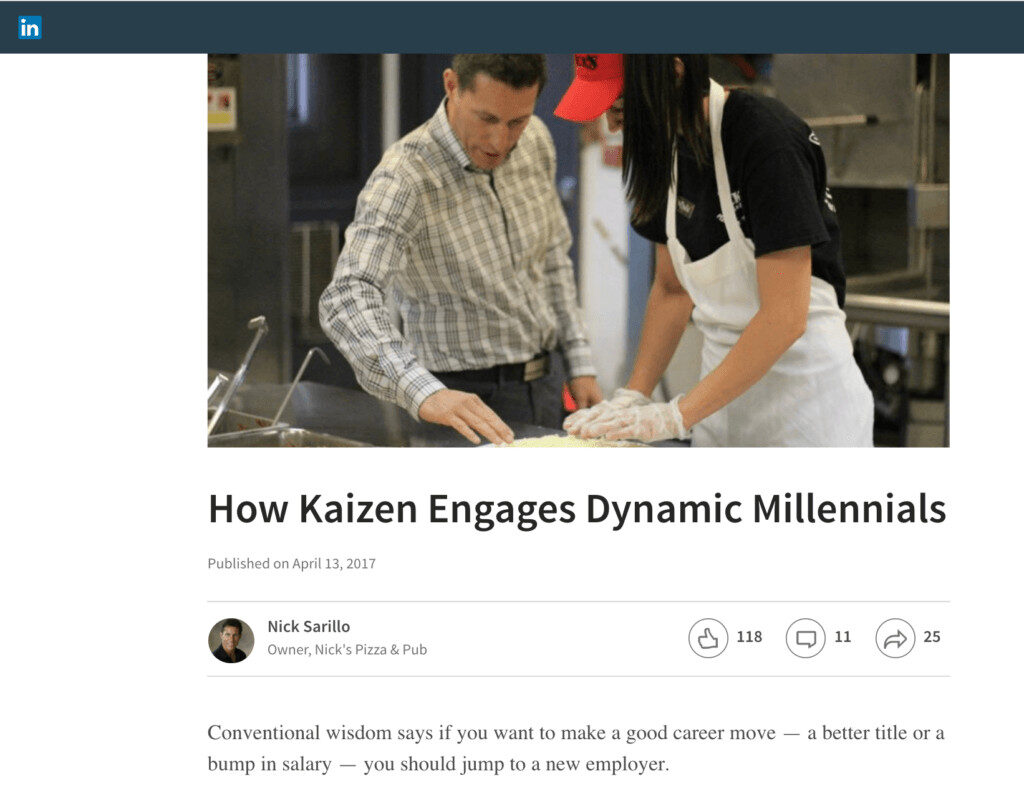
This week, Kaizen will be on my mind a lot as Joe Swartz and I work together to host 26 visitors to his health system, Franciscan St. Francis, for the “Kaizen Live!” event. I'll be tweeting from the event, especially Wednesday and Thursday, so look for my tweets and the hashtag #KaizenLive.
Franciscan has a very special culture… and 10 years of work on a culture of continuous improvement is a big part of that. I admire everybody who is working on that important challenge — leading differently and changing the culture, as we see more recently at Cleveland Clinic (check out my recent podcast about their efforts) and so many other organizations.
There's a lot of negativity in the world and in healthcare (and I'm guilty of adding to that negativity), but Kaizen is positive and inspiring. And that's why I'm excited about this week.
But, this Kaizen culture isn't limited to healthcare and manufacturing…
A few years ago, I learned about an Illinois pizza restaurant chain with a pretty special culture — Nick's PIzza & Pub. I had a chance to visit with Nick Sarillo at one of his restaurants, which I followed up with a podcast in 2012 about Nick's book A Slice of the Pie: How to Build a Big Little Business.
Here is my original 2010 blog post about him:
And the podcast:
Podcast #157 – Nick Sarillo, ‘A Slice of the Pie' – Leadership Lessons from a Pizza Chain
I was happy to see this recent article by Nick on LinkedIn:
How Kaizen Engages Dynamic Millennials
As Nick writes, leaders shouldn't blame Millennials (or I'd say any employee) for perceived bad traits, instead:
“…we should take a hard look at ourselves as leaders to see how can we create continuous opportunities for improvement for our employees, a concept summed up by the Japanese term, kaizen.”
It's great that Nick recognizes that Millennials want this sort of environment. As I've blogged about before, though, I think other generations have desires similar to what often gets ascribed to this younger generation.
Nick adds:
“Transparency and flexibility are key elements to kaizen, and these traits for continuous improvement…”
I think every employee wants a culture where they can do quality work and contribute toward improvement. That requires trust and mutual benefit within the company (or hospital).
To have continuous improvement, there needs to be transparency about problems, goals, improvement activity, etc. Transparency requires trust in all directions… trust leads to Kaizen, Kaizen can then lead to real accountability, as I've written about:
I was also happy to see Nick and his company make a best small companies list:
Illinois Businesses Make Forbes Best Small Companies List
From the announcement:
[Nick's] also had a vibrant culture built around what he called his “trust-and-track” (as opposed to command-and-control) approach to managing.
Lean is, of course, an alternative to the old “command and control” leadership style. Unfortunately, when command-and-control thinkers get introduced to Lean, the approach often gets misunderstand as a way of strengthening all C&C tendencies.
See my past blog posts about “command and control” and the problems that the approach creates.
And, again, stay tuned for more posts and tweets about Kaizen this week.
Please scroll down (or click) to post a comment. Connect with me on LinkedIn.
Let’s build a culture of continuous improvement and psychological safety—together. If you're a leader aiming for lasting change (not just more projects), I help organizations:
- Engage people at all levels in sustainable improvement
- Shift from fear of mistakes to learning from them
- Apply Lean thinking in practical, people-centered ways
Interested in coaching or a keynote talk? Let’s talk.
Join me for a Lean Healthcare Accelerator Trip to Japan! Learn More











A blog post from Maggie Millard at KaiNexus on Kaizen and Millennials:
The Value of Millennials in a Kaizen Culture & How to Keep them Happy
Comments are closed.